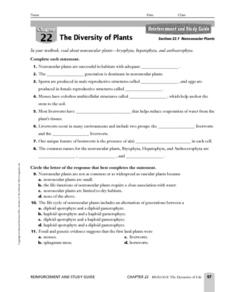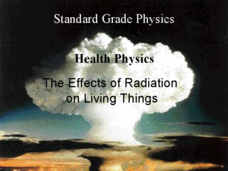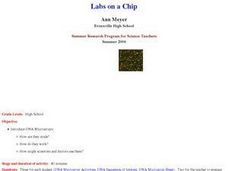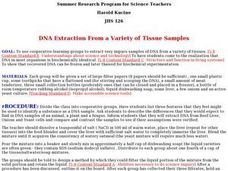Curated OER
Cnidarians
In this cnidarians learning exercise, students will read 4 descriptions and identify each as either the polyp or medusa form of cnidarian. Then students will complete 3 short answer questions about the characteristics of cnidarians....
Curated OER
Bones: The Body's Support
In this bones activity, students compare the axial and the appendicular skeletons. Students also review the bone components. This activity has 6 matching, 8 short answer, 4 fill in the blank, and 6 true or false questions.
Curated OER
Human Development: The First Trimester & Developmental Malformations
Students, analyze and discuss cleft lip, cleft palate, anencephaly, spina bifida and septal defects in the heart--well-known malformations that can occur in the first trimester of prenatal devalopment. They play the review game, Fetal...
Curated OER
What Does My Bacteria Look Like?
Students identify Gram positive and Gram negative bacteria using staining techniques. Students research importance of identification of bacterial types in diagnosing bacterial diseases.
Curated OER
Nonvascular Plants
In this nonvascular plant worksheet, students compare the characteristics of bryophyta, hepatophyta, and anthocerophyta. This worksheet has 8 fill in the blank and 3 multiple choice questions.
Curated OER
Ferns and Gymnosperms
For this plant worksheet, students review the different characteristics of ferns and gymnosperms. This worksheet has 12 fill in the blank questions.
Curated OER
Launching a Defense; Understanding the Human Immune System
Students research online to answer and develop questions about immune system, create Powerpoint presentation to share information with classmates, and assimilate information into pictorial and/or graphical description of immune system.
Curated OER
Launching a Defense; Understanding the Human Immune System
Students research online to answer and develop questions about immune system, create Powerpoint presentation to share information with classmates, and assimilate information into pictorial and/or graphical description of immune system.
Curated OER
Ghost in Your Genes
Students explore DNA microarrays. In this genetics instructional activity, students model DNA microarrays that are used by scientists. Students work to determine levels of breast cancer genes in patients. They will determine the...
Howard Hughes Medical Institute
The Making of the Fittest: The Birth and Death of Genes
Adaptations must be made as environments change. This fabulous presentation features Icelandic icefish, a transparent, scaleless specimen that even has colorless blood. Genetics and adaptations concepts are explored as scientists study...
Cornell University
Shedding a "Little" Light on Cancer Surgery
Many types of cancer treatments now depend on nanotechnology—a big "little" discovery. Scholars begin by removing "malignant" tissue from simulated brains, one using fluorescent markers thanks to nanotechnology and one without. This...
Curated OER
Lipids: Fats and Oils
A fantastic presentation with great images should improve student understanding of lipids and their involvement in the body. The chemistry of different fats, phospholipids, and steroids are explained. Additionally, the specific uses,...
Curated OER
Transport in Plants
Quite a detailed and advanced look at the transport mechanisms of a plant. The absorption and control of sugar and water concentration are explained and will help an understanding of homeostasis concepts and organ specialization.
Curated OER
Proteins
As long as you have some support information to answer questions that may come up from students, this is an excellent PowerPoint to cover almost all aspects of protein structure and ionization. The sequence of slides has great images and...
Curated OER
Health Physics: The Effects of Radiation on Living Things
A mix of scientific details and background information about the well-known sites of radiation attacks or accidents. This topic may open up details that you may consider as sensitive, and could be upsetting to some pupils. This is a...
Serendip
From Gene to Protein via Transcription and Translation
DNA carries the codes for creating just the right protein. A well-designed lesson leads pupils through the process from start to finish and everywhere in between. Guiding questions with supporting video help scholars understand the...
Curated OER
Semipermeable Membranes and Bioaccumulation
Beginning biologists place a drop of food coloring into water of differing temperatures to observe the effect on the diffusion rate. They remove the shells from raw eggs and then experiment with osmosis over the remaining membranes....
Curated OER
Atoms and Elements: An Introduction
Students are able to discuss the difference between a proton, a neutron and an electron. They also can explain the difference between an ionic and a covalent bond. Students know the main structure of atoms and molecules. Student are able...
Curated OER
Genetically Modified Organisms
High Schoolers complete a variety of activities as they examine the ethics of (and take a position concerning) genetically modified organisms in the field of agriculture. They complete a PowerPoint demonstration to go along with the unit.
University of Minnesota
What's the Deal? Addiction Card Game
Addiction is a big deal! Playing a game of cards helps learners understand the concept of addiction. Through their analysis, they examine the potential for addiction and how it varies for each individual.
Curated OER
Labs on A Chip
Students are introduced to DNA microarrays. They discuss how scientists and doctors use them and how they work. They complete a worksheet and discuss their findings.
Curated OER
Different Types of Orange Juice Contain the Same Amounts of Vitamin C?
Students measure and compare the amount of vitamin C in orange juice samples. They discover the effects of different factors on the concentration of vitamin C. They participate in an experiment to test the orange juice.
Curated OER
DNA Extraction From a Variety of Tissue Samples
Students, working in cooperative groups, extract very impure samples of DNA from a number of tissue samples. They determine how the samples can be preserved and how they are similar.
Curated OER
Describe the Perfect Pathogen
Students develop a pathogen based upon their knowledge of pathogens and after presenting it to the class, they then suggest ways that the pathogen might be combated. Next they identify possible physical or behavioral changes in a...

























